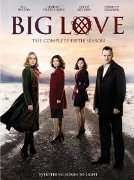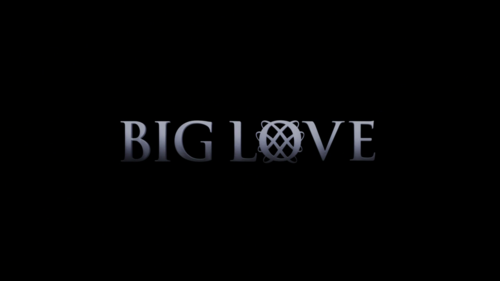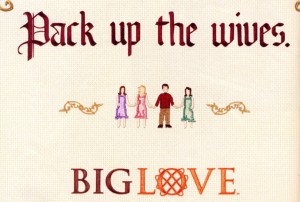BUY FROM AMAZON: CLICK HERE!
STUDIO: HBO Home Video
MSRP: $32.59
RATING: N/A
RUNNING TIME: 600 minutes (10 episodes)
SPECIAL FEATURES
- Featurettes for each episode
- Final episode documentary
The Pitch
Big Love meets The West Wing.
The Humans
Created by Mark V. Olsen and Will Scheffer. Starring “Big” Bill Paxton, Jeanne Tripplehorn, Chloe Sevigny, and Ginnifer “Love” Goodwin.
The Nutshell
Bill “outs” his family as polygamists after being elected to the office of state senator; Barb grows apart from her husband and Sister Wives as she explores the possibility of joining a new church and becoming a priesthood holder; Nicki struggles to control her willful teenage daughter Cara Lynn, who makes her mother’s worst nightmares come true by getting involved with her middle-aged math tutor; and Margene plunges the family into turmoil by getting involved with a pyramid scheme, repeatedly provoking an unstable neighbor, and ultimately revealing that she was underage when she and Bill got hitched.
The Lowdown
“Why are you trying this family so unmercifully? We struggle to keep your commandments, to dwell in love. I can bear any burden, endure any trial, but please spare my family these unending punishments.”
These words come early in the final season of Big Love, and after following the trials and tribulations of the Henrickson family for five long years, I have to say… I feel like I know where poor Bill is coming from. This may be one reason why “genre” shows tend to be more popular with guys like me than traditional dramas. Take procedurals, for instance: in your average cop show, it’s understood that the lead characters will be investigating a murder (or kidnapping, or missing persons case) in each episode. By the end of the hour the current crisis will be resolved, and next week our heroes will have a new villain to track down. Personal drama often takes a back seat to the show’s main plotline.
In a show like Big Love, however, the drama is the main plotline. And without a comforting (if predictable) formula to help distract from all the emotional turmoil, things can start to feel a bit heavy after a while, and the threats faced by the characters can start to seem forced and “piled on.” Am I saying Love would be a better show if Bill was some sort of freewheeling Mormon bounty hunter, chasing down a different wayward polygamist each week? Not at all. But as the quote above illustrates, it’s hard to watch even one season of this show, let alone five, without starting to feel as though Heavenly Father really does have it in for the Henrickson clan.
The relationship between Bill and his wives takes center stage on this show, and even though the underlying message of the series seems to be that love will endure… not to be indelicate, but that sentiment might have a little more resonance if it felt as though any of these people could actually stand each other. I realize that conflict equals drama, and that people getting along reasonably well doesn’t necessarily make for compelling TV, but not an hour of this show goes by without three or four (or five or six, or sometimes seven) different arguments breaking out. Someone should come up with a Big Love drinking game: do a shot every time Barb storms out of the room crying, or every time Nicki starts a fight over something childish and petty. Take three if those things occur within two minutes of each other.
It may seem as though I don’t think much of the show, but that’s not the case… in fact, I enjoyed most of this season’s storylines, and overall I feel the fifth season is a Big improvement over the third and fourth. I like that they’ve done away with the silly Indian casino subplot, and that the (beyond silly) shenanigans of J.J., Albie, and the Greenes are given much shorter shrift here than in previous years. Bill, in particular, comes off well for the most part; this may not be a common sentiment among the show’s fanbase, but I think Bill is at his best character-wise when he’s standing up for his beliefs and railing against perceived injustice, and that element is in full force here, with Bill using his newly minted position as a Utah state senator to bring down the Grants and crusade for the legalization of polygamy.
If there’s an underlying theme that runs throughout the series as a whole, it’s one of intolerance; and in particular, religious-based intolerance of other lifestyles. In fact, I’d argue that the struggles of Bill and his family (and by extension other “mainstream” polygamist types) could be seen as a metaphor for the gay rights movement. In the real world, efforts to legalize gay marriage led to constitutional amendments seeking to ban the practice; in the world of Big Love, Bill’s attempts to bring polygamist families “into the light” result in a campaign by his political rivals to have their lifestyle overtly criminalized. And just as many real-world zealots view homosexuals as deviants and child molesters, the mainstream Mormons of Big Love are unable to distinguish between the seemingly harmless brand of polygamy practiced by the Henricksons, and the abuse and fanaticism of the compounds. The show is at its strongest dramatically when it focuses on these central ideals.
Where things get a bit murkier, I think, is in the show’s portrayal of religion in general. The Henricksons often draw strength from their faith, but religion is also the cause of most of the unhappiness in their lives, since religious intolerance is what forces them to live in secrecy. (The legal consequences of polygamy being largely a thing of the past, at least in the early seasons). Barb and her Sister Wives fight for legal recognition, yet it’s the government’s refusal to intervene in religious matters that allows the cesspool of Juniper Creek, and presumably other fundamentalist communities similarly rife with corruption, to fester. The compounds are demonized for pimping underage girls to dirty old men, yet Bill himself married an underage girl, albeit unwittingly.
Nowhere is the show’s ambivalence more apparent than in the portrayal of its central character. Bill crusades for religious tolerance, yet stubbornly refuses to recognize Barb’s (or any woman’s) entitlement to the priesthood. He cavorts with his numerous wives, yet claims it’s “unnatural” for a woman to have more than one husband. He rages after learning that Cara Lynn has become involved with her teacher, yet he himself is guilty of having a sexual relationship with an underage girl. Not to get on a moral high horse, but legal matters aside, it’s either inappropriate and sleazy for a man in his late 30’s (or possibly older, in Bill’s case) to pursue a romantic relationship with a teenage girl, or it’s not. The really interesting thing here is that, Bill’s feelings aside, neither he or Cara Lynn’s teacher are portrayed as predators; Bill is simply guilty of not doing his homework, and poor Greg seems guilty of nothing more egregious than immaturity and bad decision-making.
The show’s attitude toward religion as a whole is equally problematic. Both GoJi and the Henrickson clan are referred to as cults, and each is accused of trying to take advantage of the supposedly innocent Margene. Yet, references to Margene having failed to make any money selling GoJi aside, neither side is ever proven correct. Both Bill and Michael Sainte (GoJi’s founder) come across as well-meaning guys who seem to genuinely be trying to help Margene; in any event, neither one is ever unmasked as a villain. I’m all for complex characterization and moral ambiguity and all that, but the show hasn’t shown any aversion to mustache-twirling villainy in the past; this year, however, only politicians and folks with the last name Grant are overtly portrayed as bad guys. Everyone else gets a pass.
The other big theme this year is women’s rights. Nicki tries to protect Cara Lynn from the predations of older men, while also helping abused women escape the compounds; Barb fights to be recognized as a priesthood holder; and Bill, while not busy marrying underage girls, bossing his wives around, or denying Barb the priesthood, finds time to deliver a painfully awkward Christmas dinner speech that ends sounding less like “Thanks for all the hard work, ladies” and more like “Thanks for washing our clothes and cooking our meals while we men-folk go out and run the world.” Good job, Bill.
The Package
The featurettes are interesting and informative, especially the documentary focusing on the final episodes. Other than that there’s not much to write home about.
Rating: 




Out of a Possible 5 Stars


